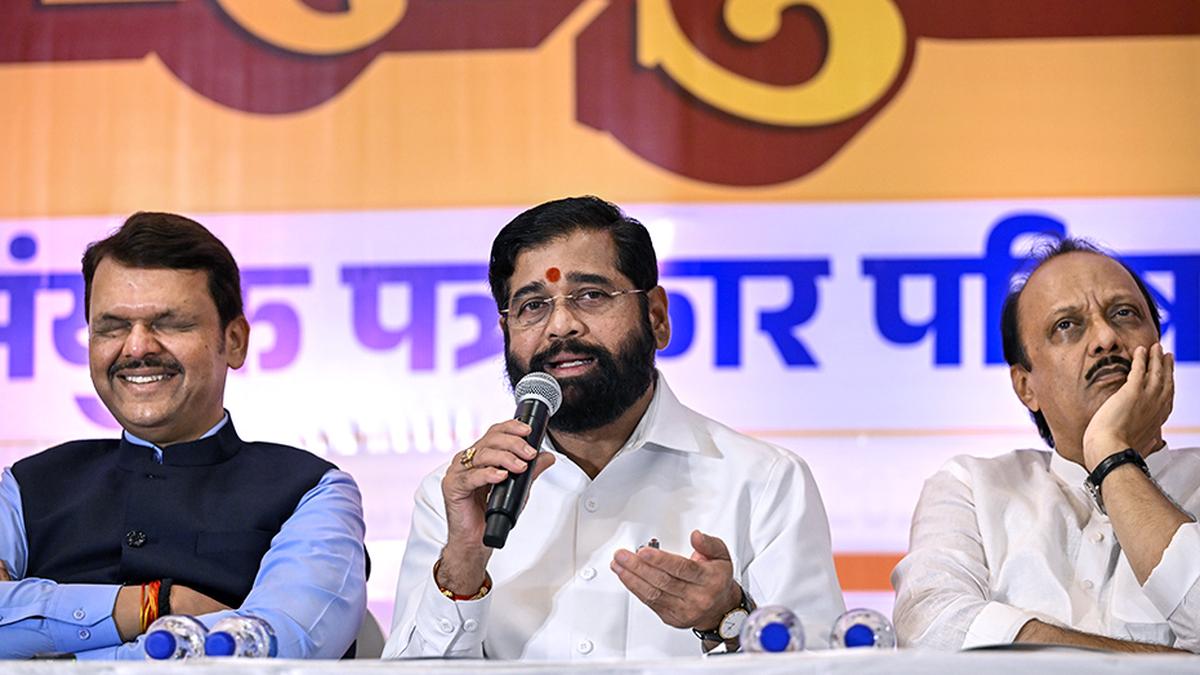File picture of Maharashtra CM Eknath Shinde, Deputy CMs Ajit Pawar and Devendra Fadnavis.
| Photo Credit: The Hindu
Uttar Pradesh Chief Minister Yogi Adityanath’s slogan, “batenge toh katenge” (divided we perish), has been deployed by the BJP in the Maharashtra Assembly election, as a rallying cry for Hindu vote consolidation and to discourage caste-based voting. However, the slogan has made its Mahayuti allies, the National Congress Party led by Ajit Pawar and Eknath Shinde-led Shiv Sena, uncomfortable.
Maharashtra Assembly polls: Full coverage
The slogan, and its spirit of Hindu unity speaks to the BJP’s vote base, and according to senior leaders, is largely aimed at preventing the division of Hindu votes as in the Lok Sabha election, especially in the crucial Vidarbha region where the BJP is going head to head with the Congress on most seats. The BJP going the whole hog with the strategy has, however, created issues for its allies for a variety of reasons. Mr. Pawar had openly spoken about his discomfiture, stating two days ago, “I am not supporting it. I have said this several times. It will not work in Maharashtra. This may work in Uttar Pradesh, Jharkhand, or some other places.” The fact that his party has, proportionately, given the largest number of tickets to minorities in the State, is a pointer to his attitude.

For Mr. Shinde’s party, locked in an existential battle with the Shiv Sena (UBT), the slogan is a reversal of attempts made by it in the last four months to diffuse a strong Muslim consolidation behind Mr. Uddhav Thackeray’s Shiv Sena.
“The attempt has been to run a positive, affirmative campaign on the back of welfare delivery like the Ladki Bahin scheme. This fear mongering by the BJP is more likely to consolidate minorities behind the Maha Vikas Aghadi, rather than uniting Hindu community voters who may not be feeling a sense of siege and may continue to vote on caste lines,” said a source. An analysis by the Mr. Shinde-led Shiv Sena of Assembly segments in the aftermath of the Lok Sabha election showed that crucial consolidation of Muslim votes behind the Shiv Sena (UBT) resulted in its victory on certain seats. For example, in the Mumbai South Lok Sabha seat, sitting MP Arvind Sawant won by a margin of 52,000 votes, of which 46,000 came from the Byculla Assembly seat alone. It is this intense consolidation that worries Mr. Shinde’s camp.

Mr. Shinde’s government has been reaching out to the Muslim community, in hopes of at least blunting the kind of consolidation that occurred in the Lok Sabha election. Mr. Shinde has set up a Commissionerate of the Minorities Development Department in Aurangabad, increased salaries of Muslim clerics, built Urdu Bhawans and had also made funds readily available for Muslim-dominated seats like Bhiwandi.
The chatter around the slogan has grown, so much so that Union Home Minister Amit Shah, who was in Mumbai for the launch of the BJP’s manifesto for the election, spoke out to clarify the issue. “The Congress has through various ways been raising the issue of castes in order to divide society. Prime Minister Narendra Modi has very clearly put across the point that if Scheduled Castes are a category then they grow stronger as one, otherwise there is fragmentation, and if Other Backward Classes are divided they too grow weaker. As for “katenge”, everyone knows under whose administration most of the riots have occurred in this country,” he said.
The BJP has its own reasons for pushing the slogan, which are deeply mired in the aftermath of the Maratha reservation movement and the Opposition’s charges that it wants to subvert the Constitution in order to end reservations. For the BJP’s allies, a campaign less polarising, premised on the welfare schemes and with space for other players for minority votes, is a better bet in a fragmented political scene. The efficacy of the slogan is still to be tested electorally.
Published – November 10, 2024 08:42 pm IST






